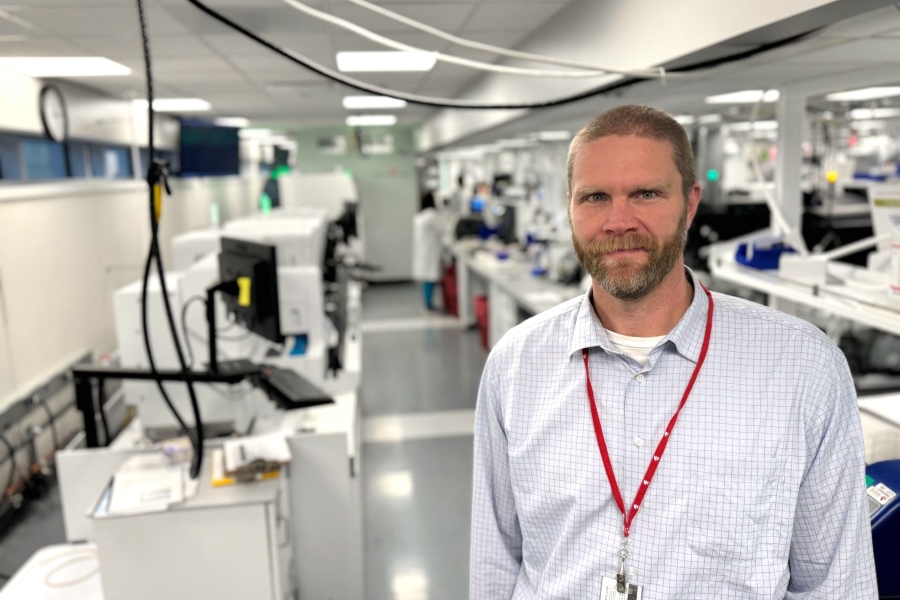Dr. Scott Koepsell, professor and vice chair of clinical operations for UNMC’s Department of Pathology, Microbiology and Immunology, says a recent inspection validates the quality of their laboratories.
Last month, staff from Thomas Jefferson University in Philadelphia working on behalf of the College of American Pathologists (CAP) examined all aspects of lab operations at Nebraska Medicine, the main campus, Bellevue Medical Center, Oakview and Village Pointe, at UNL and now also at Grand Island-internal medicine.
CAP is empowered by the Centers for Medicare & Medicaid Services (CMS) to oversee and make sure all of the federal requirements for patient care and testing are being met. “In other words,” he said, “for a clinician, a physician or a non-physician provider to be able to trust the lab result, we have to meet certain standards that are laid out in the law, called CLIA (the Clinical Laboratory Improvement Amendment). The inspection team was here for two days, “looking up all aspects of our laboratory operation—cytogenetics, HLA, anatomic pathology, cytopathology, electron microscopy, autopsy, everything, top to bottom, thousands of checklist items.”
Dr. Koepsell said CAP inspections finds 0.8 to 0.9 percent of checklist items not in compliance on average. “And this year we were at 0.39,” he said. “We improved quite a bit from our last accreditation cycle, which hit right during the COVID pandemic. Then we had over a 1 percent deficiency rate, for multiple reasons—staff shortages and so forth.”
Dr. Koepsell credited part of the improvement to the establishment of a dedicated quality team for all laboratory operations, something championed by Dr. Joseph Khoury, the department chair, after his arrival at UNMC in 2022. “We’ve had quality oversight of certain aspects of the laboratory in the past, but we have expanded that to include all laboratory operations, and I think that showed very nicely this time,” he said.
“For the areas where we found improvement was needed, we developed an action plan and submitted that to CAP for their review. Corrective action plans are things like improving your SOP, changing a form or training your staff a little bit differently in some aspect. And we just heard back yesterday that they accepted our corrective action plans, and so we should be good.”
The CAP inspections come every two years, though the process never really ends, he said. “On the years that we are not being assessed by an external organization, we do our own internal self-inspection on those same items.”
But he said there’s no substitute for having experts from other institutions come and validate what you’re doing or identify any issues that you have. “I think it’s a really great program. I feel very confident that it helps us achieve the highest quality we can for our patients. I look forward to it, because they often bring a lot of great ideas,” he said.
“From our standpoint, I don’t think there’s a lot of trepidation. There’s a lot of preparation that goes into this. We have a software package where we upload all the thousands of checklist items and for each one of them, they get assigned to the bench-side experts. And they will upload their evidence of compliance for each checklist item. So by the time the inspection team gets here, our staff have already looked through the checklist items, uploaded what they feel is evidence of compliance for that checklist item. And I think they feel pretty good about their work.
“Maybe for people who are going through the inspection process for the first time, it might be a little nerve-racking,” he said, “a little intimidating to have someone come in and start asking about what you’re doing and how you do it and what about this and what about this, and how do you handle this? But overall, I think our staff look forward to the interaction. We’re happy when it’s over with, but we just recognize it as an ability to improve ourselves, not as oh boy, we’re being graded.”
A new team of inspectors will come to UNMC in 2027, and next year Dr. Koepsell will take a team of 15 to 20 to inspect another institution. “It’s exciting for us, because our team then gets to be on the other side of the inspection process and learn from the organization we’re visiting as well. And when we come back, it helps the people understand what goes into the inspection process and do better for our own inspection. So it’s sort of a revolving improvement process. It’s a big team effort. Hundreds of people help out with it. So I just appreciate everybody’s support,” he said.
